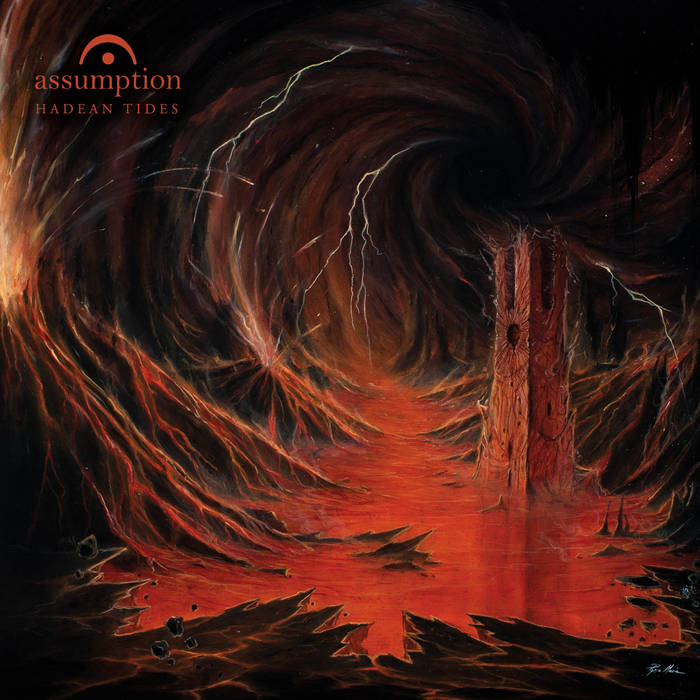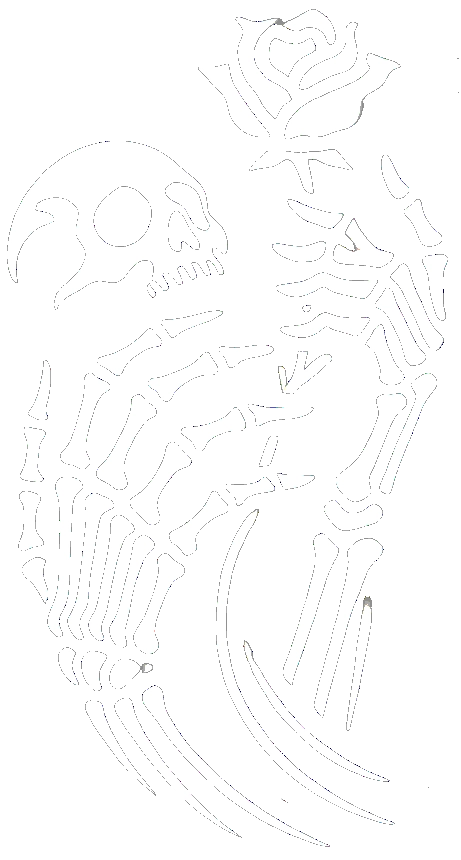Progressive Funeral and Death Doom, anyone? Here’s a double feature on offer.
The Italians Assumption with Hadean Tides and the French band Epitaphe with II. It’s the second album for both bands, they follow a similar direction, both clearly reference Esoteric and Opeth, and both have shown noticeable progress.

Assumption previously carried the label of being an “Esoteric clone.” And in a way, that’s still somewhat applicable. Daughters of the Lotus sounds like a direct audition for Esoteric’s guitarist position. But the Italian band adds its own individual touch to their obvious love letter to the British institution of extreme doom. It starts with drummer David Lucido, whose fantastically energetic playing opens up dynamic possibilities that Assumption are able to explore convincingly. Already the opener Oration doesn’t just stick to doom-laden death metal—it blasts out a minute of straight death metal before the doomy parts and a touch of psychedelia unfold. Choosing such a raw, aggressive opening might well be a deliberate move to emancipate themselves from the “copycat” accusation.
Another factor is the rich production handled by Manuele Marani. The powerful playing heard on Submerged by Hadean Tides might have been lost in the mix of a merely good band, but not here. On the other hand, the mesmerizing Triptych, which initially feels soothing, gradually intensifies—particularly through Claudio Troise’s folky bass lines and Giorgio Trombino’s clear, spoken-word-like vocals. This makes the heavier riffs and muscular outbursts of the chorus and bridge even more impactful. The production and dynamic range expand on the Esoteric legacy, especially through traces of psychedelia in the clean guitar tones and drawn-out riffs on tracks like Black Trees Waving or Daughters of the Lotus.
This is why Hadean Tides works so well—Assumption aren’t just copying. They use the guitar work and songwriting of bands like Esoteric and Disembowelment as a foundation for their own take on Extreme Doom. Without Greg Chandler’s typical vocal layering, without samples, and—aside from brief moments and the ambient interlude Breath of the Dedalus—without keyboards, they create their own stylistic fusion. With Hadean Tides, Assumption grow within and beyond the ideas of the genre’s founding bands, dynamically shifting between Death Metal, Extreme Doom, and Psychedelic touches. No, it’s not wildly innovative—but it’s full of individuality within the genre. And that counts. It’s good—damn good.

But I wanted a comparison, and in that comparison, Epitaphe wins—because the French band takes things a step further than Assumption, and further than they themselves did on their debut I. With II, Epitaphe creates a sonic cosmos of their own, elevated into a journey. The base remains Extreme Doom and Prog, but they shape a unique sound—sometimes coarse, sometimes elegant—free from convention and overflowing with creative vision.
Names like Inverloch, Krypts, Ruins of Beverast, Spectral Voice, or early Opeth may serve as rough but ultimately unsatisfying analogies. Where Assumption move within familiar parameters but do so well, Epitaphe stand out in a field of shapeshifting, often offbeat, nearly chaotic riff structures and relentless drum work that denies any easy exit. The Pink Floyd-esque acoustic guitar intro, along with an ambient outro, bookends the album and prepares the listener. The core experience lies in three pieces, each about 19 minutes long, weaving in and out of quiet psychedelic and acoustic phases to deliver top-tier progressive death metal.
The dynamics keep things alive and engaging. II constantly shifts between fast and slow, loud and soft, without falling into post-metal clichés. Sometimes these transitions explode into the quieter moments, other times they flow organically from one state into the next. Moments of tragic melody and tender melancholy, of synth landscapes and dreamy clean vocals, stand in contrast to eruptions of chaos, hate, aggression, and sheer force.
II is a complete work of art that resists being broken into digestible bits. You either listen to the whole thing—or not at all. But if it grabs you, it’s an all-encompassing experience.
Taken in contrast with Assumption’s latest release, Epitaphe achieves something that Assumption never even intended to: they sound refreshingly original, different—and in their uniqueness, utterly outstanding. Assumption are good. Epitaphe are one of a kind.

